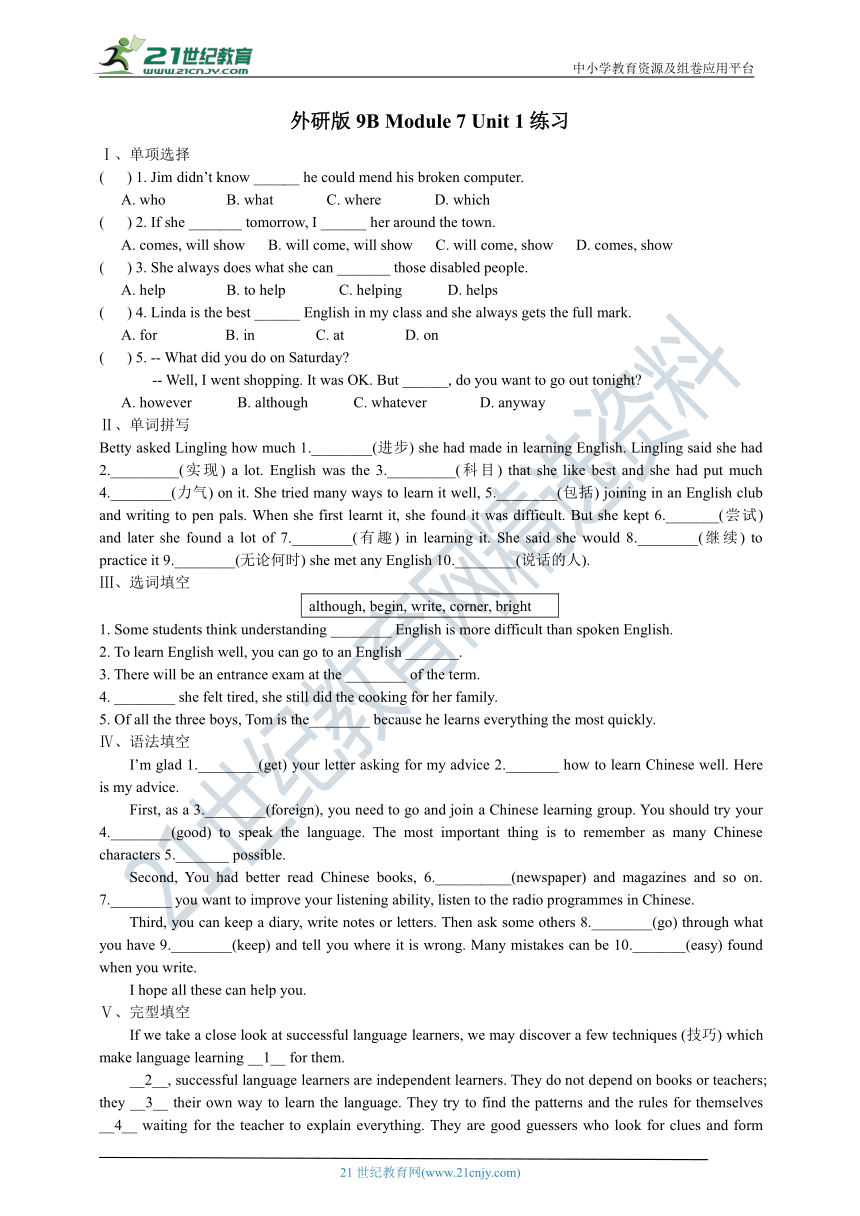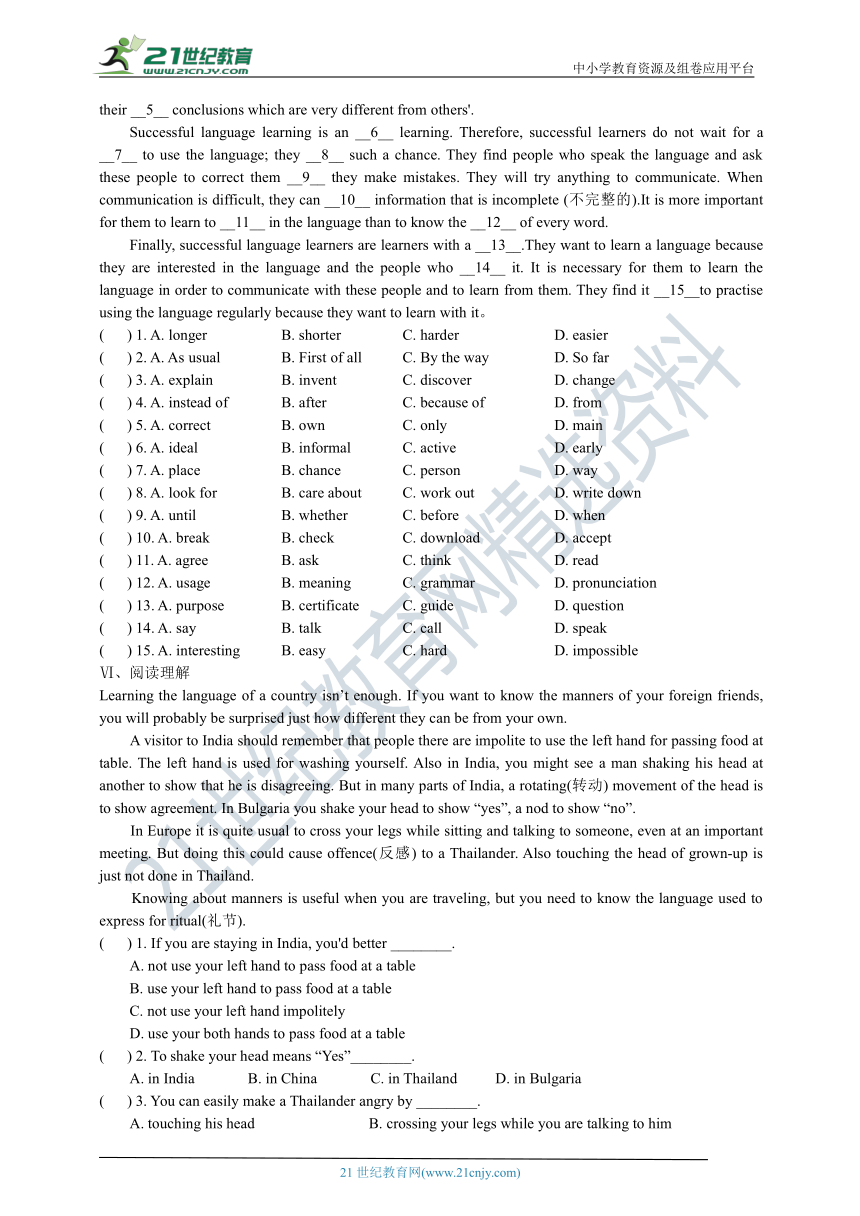Module 7 English for you and me Unit 1 Have you ever been to an English corner? 同步练习(含答案)
文档属性
| 名称 | Module 7 English for you and me Unit 1 Have you ever been to an English corner? 同步练习(含答案) |

|
|
| 格式 | zip | ||
| 文件大小 | 1.1MB | ||
| 资源类型 | 试卷 | ||
| 版本资源 | 外研版 | ||
| 科目 | 英语 | ||
| 更新时间 | 2020-03-20 16:22:30 | ||
图片预览


文档简介
中小学教育资源及组卷应用平台
外研版9B Module 7 Unit 1练习
Ⅰ、单项选择
( ) 1. Jim didn’t know ______ he could mend his broken computer.
A. who B. what C. where D. which
( ) 2. If she _______ tomorrow, I ______ her around the town.
A. comes, will show B. will come, will show C. will come, show D. comes, show
( ) 3. She always does what she can _______ those disabled people.
A. help B. to help C. helping D. helps
( ) 4. Linda is the best ______ English in my class and she always gets the full mark.
A. for B. in C. at D. on
( ) 5. -- What did you do on Saturday?
-- Well, I went shopping. It was OK. But ______, do you want to go out tonight?
A. however B. although C. whatever D. anyway
Ⅱ、单词拼写
Betty asked Lingling how much 1.________(进步) she had made in learning English. Lingling said she had 2._________(实现) a lot. English was the 3._________(科目) that she like best and she had put much 4.________(力气) on it. She tried many ways to learn it well, 5.________(包括) joining in an English club and writing to pen pals. When she first learnt it, she found it was difficult. But she kept 6._______(尝试) and later she found a lot of 7.________(有趣) in learning it. She said she would 8.________(继续) to practice it 9.________(无论何时) she met any English 10.________(说话的人).
Ⅲ、选词填空
although, begin, write, corner, bright
1. Some students think understanding ________ English is more difficult than spoken English.
2. To learn English well, you can go to an English _______.
3. There will be an entrance exam at the ________ of the term.
4. ________ she felt tired, she still did the cooking for her family.
5. Of all the three boys, Tom is the________ because he learns everything the most quickly.
Ⅳ、语法填空
I’m glad 1.________(get) your letter asking for my advice 2._______ how to learn Chinese well. Here is my advice.
First, as a 3.________(foreign), you need to go and join a Chinese learning group. You should try your 4.________(good) to speak the language. The most important thing is to remember as many Chinese characters 5._______ possible.
Second, You had better read Chinese books, 6.__________(newspaper) and magazines and so on. 7.________ you want to improve your listening ability, listen to the radio programmes in Chinese.
Third, you can keep a diary, write notes or letters. Then ask some others 8.________(go) through what you have 9.________(keep) and tell you where it is wrong. Many mistakes can be 10._______(easy) found when you write.
I hope all these can help you.
Ⅴ、完型填空
If we take a close look at successful language learners, we may discover a few techniques (技巧) which make language learning __1__ for them.
__2__, successful language learners are independent learners. They do not depend on books or teachers; they __3__ their own way to learn the language. They try to find the patterns and the rules for themselves __4__ waiting for the teacher to explain everything. They are good guessers who look for clues and form their __5__ conclusions which are very different from others'.
Successful language learning is an __6__ learning. Therefore, successful learners do not wait for a __7__ to use the language; they __8__ such a chance. They find people who speak the language and ask these people to correct them __9__ they make mistakes. They will try anything to communicate. When communication is difficult, they can __10__ information that is incomplete (不完整的).It is more important for them to learn to __11__ in the language than to know the __12__ of every word.
Finally, successful language learners are learners with a __13__.They want to learn a language because they are interested in the language and the people who __14__ it. It is necessary for them to learn the language in order to communicate with these people and to learn from them. They find it __15__to practise using the language regularly because they want to learn with it。
( ) 1. A. longer B. shorter C. harder D. easier
( ) 2. A. As usual B. First of all C. By the way D. So far
( ) 3. A. explain B. invent C. discover D. change
( ) 4. A. instead of B. after C. because of D. from
( ) 5. A. correct B. own C. only D. main
( ) 6. A. ideal B. informal C. active D. early
( ) 7. A. place B. chance C. person D. way
( ) 8. A. look for B. care about C. work out D. write down
( ) 9. A. until B. whether C. before D. when
( ) 10. A. break B. check C. download D. accept
( ) 11. A. agree B. ask C. think D. read
( ) 12. A. usage B. meaning C. grammar D. pronunciation
( ) 13. A. purpose B. certificate C. guide D. question
( ) 14. A. say B. talk C. call D. speak
( ) 15. A. interesting B. easy C. hard D. impossible
Ⅵ、阅读理解
Learning the language of a country isn’t enough. If you want to know the manners of your foreign friends, you will probably be surprised just how different they can be from your own.
A visitor to India should remember that people there are impolite to use the left hand for passing food at table. The left hand is used for washing yourself. Also in India, you might see a man shaking his head at another to show that he is disagreeing. But in many parts of India, a rotating(转动) movement of the head is to show agreement. In Bulgaria you shake your head to show “yes”, a nod to show “no”.
In Europe it is quite usual to cross your legs while sitting and talking to someone, even at an important meeting. But doing this could cause offence(反感) to a Thailander. Also touching the head of grown-up is just not done in Thailand.
Knowing about manners is useful when you are traveling, but you need to know the language used to express for ritual(礼节).
( ) 1. If you are staying in India, you'd better ________.
A. not use your left hand to pass food at a table
B. use your left hand to pass food at a table
C. not use your left hand impolitely
D. use your both hands to pass food at a table
( ) 2. To shake your head means “Yes”________.
A. in India B. in China C. in Thailand D. in Bulgaria
( ) 3. You can easily make a Thailander angry by ________.
A. touching his head B. crossing your legs while you are talking to him
C. shaking your head D. passing the food with your left hand
( ) 4. The writer thinks that to know about a country well one must ________.
A. know how to eat at a table B. know how to express “YES” and “NO”
C. know its manners and its language D. know how to sit when you are with them
( ) 5. You can infer(推断) from the passage that ________.
A. the manners in Thailand are the same as in China
B. you should be careful not to cross your legs at an important meeting in Europe
C. you should not touch a grown-up's head in India
D. If you nod to a Bulgarian, he knows that you agree with him
参考答案
Ⅰ、单项选择
1-5 CABCD
Ⅱ、单词拼写
1-5 progress, achieved, subject, effort, including
6-10 trying, fun, continue, whenever, speakers
Ⅲ、选词填空
1-5 spoken, corner, beginning, Although, brightest
Ⅳ、语法填空
1-5 to get, on, foreigner, best, as
6-10 newspapers, If, to go, kept, easily
Ⅴ、完型填空
1-5 DBCAB 6-10 CBADD 11-15 CBADB
Ⅵ、阅读理解
1-5 ADBCC
21世纪教育网 www.21cnjy.com 精品试卷·第 2 页 (共 2 页)
HYPERLINK "http://21世纪教育网(www.21cnjy.com)
" 21世纪教育网(www.21cnjy.com)
同课章节目录
- Module 1 Travel
- Unit 1 We toured the city by bus and by taxi
- Unit 2 It's a long story.
- Unit 3 Language in use
- Module 2 Education
- Unit 1 They don't sit in rows.
- Unit 2 What do I like best about school?
- Unit 3 Language in use
- Module 3 Life now and then
- Unit 1 They sometimes work harder.
- Unit 2 I think life is better today.
- Unit 3 Language in use.
- Module 4 Rules and suggestions
- Unit 1 You must be careful of falling stones.
- Unit 2 we must keep the camp clean.
- Unit 3 Language in use.
- Revison A
- Module 5 Look after yourself
- Unit 1 We'd better get you to hospital.
- Unit 2 Get off the sofa!
- Unit 3 Language in use.
- Module 6 Eating togethe
- Unit 1 When is the school-leavers' party?
- Unit 2 Knives and forks are used for most Western
- Unit 3 Language in use
- Module 7 English for you and me
- Unit 1 Have you ever been to an English corner?
- Unit 2 We all own English.
- Unit 3 Language in use
- Module 8 My future life
- Unit 1 Here's to our friendship and the future
- Unit 2 I know that you will be better at maths.
- Unit 3 Language in use
- Revison B
